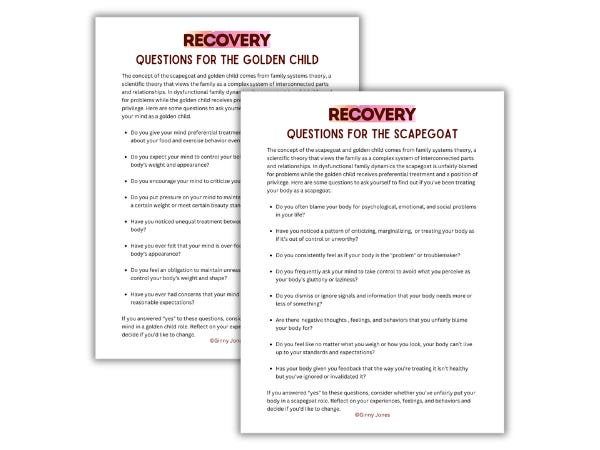My mind and body were locked in a dysfunctional relationship
I had to stop treating my body as the scapegoat, my mind the golden child
Hello! Let’s talk about respecting our bodies.
When I was very young, my mind became the golden child and my body the scapegoat. I’m not alone. I think most of us develop this mindset due to strong cultural messages telling us our bodies are unruly objects to be manipulated by the superior mind.
My poor body. I feel so bad about what I did to it for decades when I treated it with such disrespect. I feel terrible that it was so easy for me to assign all my troubles and fears to my body, never caring for its needs and desires. But it’s OK … we’re healing ❤️
The concept of the scapegoat and golden child comes from family systems theory, a scientific theory that views the family as a complex system of interconnected parts and relationships. In dysfunctional family dynamics, the scapegoat is unfairly blamed for problems while the golden child receives preferential treatment and a position of privilege.
Here are some ways I treated my body as a scapegoat:
Blaming: I assigned my body unfair blame and responsibility when I experienced bullying, teasing, and psychological pain.
Projection: I projected the majority of my negative feelings like despair, loneliness, and shame onto my body.
Targeting: I targeted my body as “the problem” as a way to avoid addressing other issues in my life.
Social dynamics: I mistreated my body to alleviate interpersonal and social tensions and conflicts.
Here are some ways I treated my mind as the golden child:
Favoritism: I gave my mind preferential treatment, praise, and positive attention.
Validation: I credited my mind for everything positive, giving it constant validation.
Privilege: My mind got all the privileges, freedom, resources, opportunities, and control.
Pressure: I constantly pressured my mind to control my body, leading to perfectionism and burnout.
Our tendency to scapegoat the body and treat the mind as our golden child goes all the way back to Socrates, Plato, and Aristotle. I’m really into philosophy, but I disagree with the premise that the body is immoral, irrational, and unintelligent and that the mind is moral, rational, and wise.
In fact, in recovery, I’ve discovered that my body is often wiser than my mind. I’ve been surprised to realize that while my mind easily leads me into dark and twisty corners, my body is straightforward and honest.
Treating my body as a scapegoat came naturally, but it just wasn’t working for me. My eating disorder was keeping me from the life I wanted to live. It was time to try another way. I had to rebalance the power dynamics and teach my body to speak up and my mind to listen.
Here’s how I did it:
1. Quiet my mind’s voice
In my eating disorder, I automatically prioritized my mind’s voice in all decisions. Should I eat this? How much should I exercise? Am I OK? I asked my mind to answer all these questions, constantly. In recovery, I learned mindfulness techniques to quiet my mind and ask it to settle down so I could listen to my body instead. I continue to treat my mind with respect and dignity, but now I’m not afraid to shush it so I can tune into my body’s opinion. As a result, it no longer dominates my decision-making process.
2. Tune into my body’s voice
In my eating disorder, I was largely unaware of my body’s signals and feedback. Tuning into my body’s voice takes a lot of effort for me, but it’s gotten a little easier with practice. I’ve gotten pretty good at quieting my mind’s voice, but noticing and translating my body’s language has been challenging. Each day, I do my best to listen and interpret my body’s wishes and desires. While I don’t think my body will ever be a yeller like my mind, I’m learning to recognize its subtle language day by day.
I’ve learned that one of my biological drivers for an eating disorder is a non-typical neurological connection between my body and mind. Even with intention and practice, noticing and communicating my body’s signals is difficult for me. The difference is that in recovery I know about this difference and prioritize rather than ignore my body.
As golden child and scapegoat, my mind and body were locked in a dysfunctional relationship, and it took time to build trust and respect between them.
Today I know that my body was never a problem. It should not have been the scapegoat, the root of my pain and insecurity. It didn’t deserve to be targeted, but that’s how it goes. It’s simply too easy in our body-toxic culture for the body to become the scapegoat and the mind to become the golden child.
Today I do my best to treat my body with the respect it’s always deserved.
🤔 What about you?
Have you treated your body as a scapegoat and your mind as a golden child? What would it mean to equalize or even prioritize your body’s preferences and desires?
If you’re a paid subscriber, I’ve got a printable worksheet for you that will help.
Keep reading with a 7-day free trial
Subscribe to Recovery by Ginny Jones to keep reading this post and get 7 days of free access to the full post archives.





